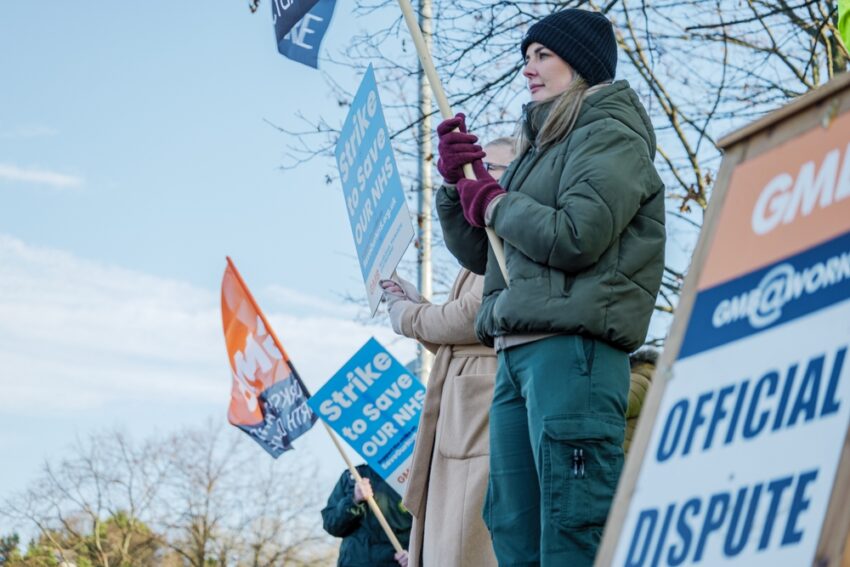
Legal changes brought by the government to let agency staff fill in for striking workers have been quashed by the high court, with ministers’ approach to the policy being labelled “irrational”.
A number of unions, including Aslef, the RMT and Unite, joined in legal challenge to “strike-breaking” regulations announced last summer by the government as it faced widespread industrial action across rail and other sectors.
In a verdict delivered on Thursday after a hearing in May, Mr Justice Linden ruled that the approach taken by ministers was “so unfair as to be unlawful and, indeed, irrational”.
Unions argued that the changes to regulations announced by the then business secretary, Kwasi Kwarteng, undermined the right to strike, and were made unlawfully.
In June 2022, Kwarteng vowed to quickly press through changes, “repealing these 1970s-era restrictions” to give “businesses freedom to access fully skilled staff at speed”. The then transport secretary Grant Shapps said it was a “vital” reform to minimise strike disruption.
However, the high court judgment said that Kwarteng showed little interest in evidence or consultation and “his approach was … so unfair as to be unlawful and, indeed, irrational”.
It also said that Kwarteng committed to changing regulations when “the advice to him was that it would be of negligible short-term benefit and probably be counterproductive”.
Responding to the judgment, Unite general secretary Sharon Graham said: “This is a total vindication for unions and workers.
“The government’s decision to allow employers to recruit agency workers to undermine legal strike action was a cynical move to back their friends in business and weaken workers’ legal rights to withdraw their labour.”
The change was one of a number that the government proposed to minimise the effectiveness of strikes, including ensuring unions and workers were legally bound to provide some services during planned industrial action. The strikes (minimum service levels) bill is still going through parliament.
Mick Whelan, general secretary of Aslef, said the train drivers’ union was “proud to have stood with other unions to challenge these changes legally, and we will continue to do so in all those other areas, including minimum service levels, to ensure a level playing field for workers here in the UK”.
The Trades Union Congress said the ruling was a “badge of shame” for the government and damning in its assessment of Kwarteng’s conduct.
Its general secretary, Paul Nowak, said: “The government railroaded through this law change despite widespread opposition from agency employers and unions. The courts even found ministers ignored evidence that the measure would be counterproductive.
“This is the same reckless approach behind the anti-strike bill, which has faced a barrage of criticism from employers, rights groups and international bodies.
“Ministers should spare themselves further embarrassment. These cynical strike-breaking agency worker laws must be scrapped once and for all – and the draconian anti-strike bill must be junked for good too.”
Richard Arthur, head of trade union law at Thompsons solicitors, said it was “a significant victory” for unions, adding that the judgment made clear that the then minister “had a staggering disregard to his legal obligations”.
He said: “This is bad law-making made on the hoof and the court has rightly held the government to account.”
A Department for Business and Trade spokesperson said: “We are disappointed with the high court’s decision as we believed the decision to repeal the ban on agency workers covering strikes complied with our legal obligations.
“The ability to strike is important, but we maintain there needs to be a reasonable balance between this and the rights of businesses and the public.
“We will consider the judgment and next steps carefully.”
Reacting to the verdict, Julia Kermode, founder of IWORK – the body championing temps and independent workers – said: “This is a big victory for workers’ rights. It’s a draconian, short-sighted legislation that threatened workers’ rights.
“Temporary workers were being drafted in at the drop of a hat to cover for striking staff. Having crossed the picket line, temps were being thrown into a hostile environment and I doubt many knew what they were in for.
“There’s a reason that staff choose to strike – and it’s not always just about pay. Many are hugely concerned about working conditions. By allowing temps to replace them in these same conditions, the government was showing zero consideration for the welfare of temporary workers.
“With this ill-thought-out legislation thrown out, the focus must turn to the quite frankly immoral anti-strikes bill. The sooner this is torn up too, the better.”